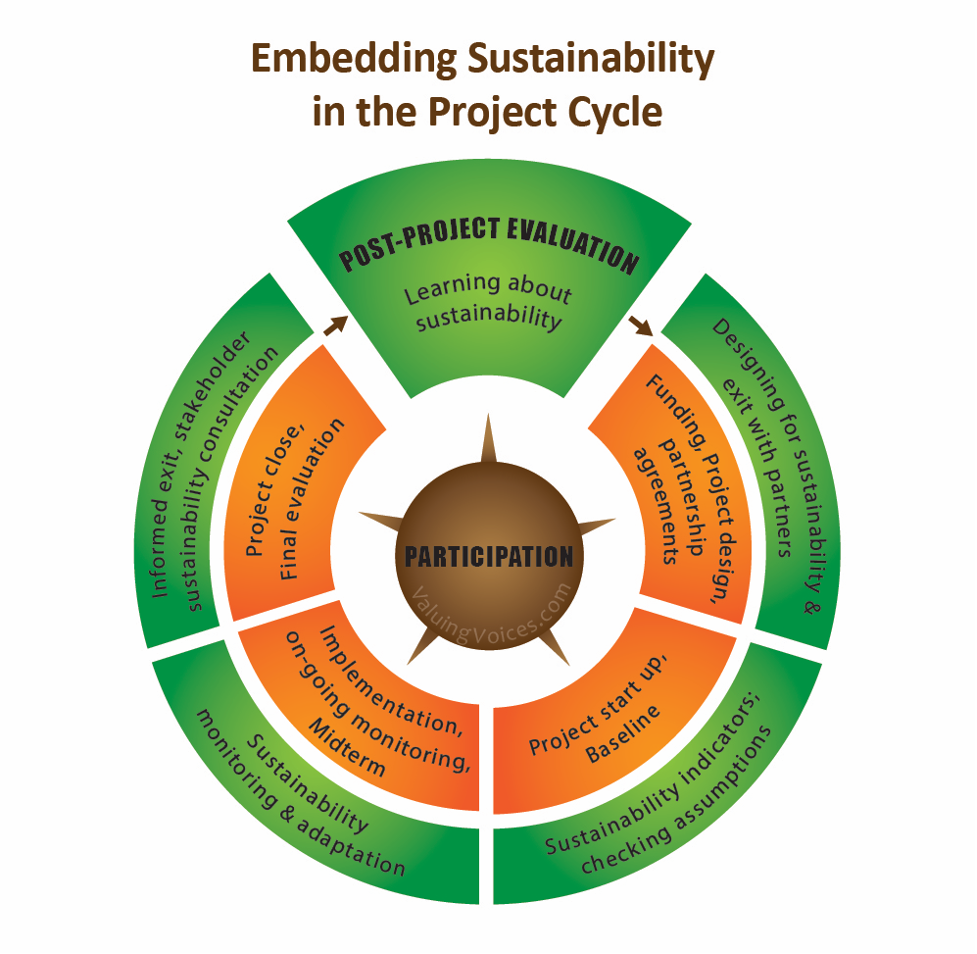
Hello. My name is Jindra Cekan, and I am the Founder and Catalyst of Valuing Voices at Cekan Consulting LLC. Our research, evaluation and advocacy network have been working on post-project (ex-post) evaluations since 2013.
Do we exit global development projects knowing our impacts are sustained? We hope so. As Professor Bea Rogers of Tufts said after evaluating 12 projects 2 years post-closure, “Hope is Not a Strategy”. Yet too often that is what projects that assume sustainability that we designed-in, does. They/we hope.
In this week’s series, we share lessons from project exits and ex-post evaluations, share guidance on how to foster sustainability.
Lessons Learned:
Instead, we need to evaluate what we expected to remain from our implemented projects and what emerged by catalyzing local’s new ways to sustain activities that are locally manageable. (For more on evaluating sustained and emerging impacts. Those provide great lessons for how to sustain while we implement.
We also need to look at assumptions about the resilience of the context in which our projects exit. As esteemed evaluators Andy Rowe/ Michael Quinn Patton noted, given climate change we need to question even more assumptions byevaluating the natural environment and sustaining natural capital on which our programming relies pre, during & implementation, at exit and ex-post closure.
But we don’t need to wait for ex-post to make sustainability more likely for years to come. We must fund, design, implement, and monitor/ evaluate For Sustainability throughout the project cycle. Donors and implementers need guidance to help support their integration of sustainability throughout, including environment & resilience, benchmarks, as well as some in our industry who have apenchant toclaim (sometimes sole) attribution for results rather than contribution.

I’ve updated my AEA blog on Sustained and Emerging Impacts Evaluations, and now see that project cycle adaptations for sustainability abound:
- How are two-way feedback loops checking assumptions of success beyond exit?
- How is handover to which stakeholders embedded from the onset, including triage of what they can sustain?
- How is sustainability embedded in the funding, partnership agreements, and phasing projects down and over during implementation rather than just at project exit out.
- What data is selected at baseline and retained post project and by whom for we need to track readiness for exit, or build better ownership, partnerships for resources and capacities. This includes including transparent benchmarking, adaptation and communications.
Rad Resources:
- The Better Evaluation site on SEIEs including examples from where impact was sustained, increased, decreased or new ones emerged;
- A webinar on Sustainability Ready: What it takes to Measure and Support Lasting Change (by Isabella Jean, Holta Trandafili and Jindra Cekan/ova)
- The brilliant perspective on evaluating natural capital and one ex-post example from JICA
- Great work on Exit Strategies that includes USAID/ FHI360/Tufts work on exit strategies, UK INTRAC’s exit strategies timeline.
- Please contact me on Jindra@ValuingVoices.com if you would like me to present Valuing Voices’interactive webinar “Sustained Exit? Prove it or Improve it!”
This week, AEA365 is celebrating Ex-post Eval Week during which blog authors share lessons from project exits and ex-post evaluations. Do you have questions, concerns, kudos, or content to extend this aea365 contribution? Please add them in the comments section for this post on the aea365 webpage so that we may enrich our community of practice. Would you like to submit an aea365 Tip? Please send a note of interest to aea365@eval.org. aea365 is sponsored by the American Evaluation Association and provides a Tip-a-Day by and for evaluators.

Forgive me, but I can’t resist doing a plug for my own work in planning for the sustainability of domestic projects:
https://communitysolutions.ca/web/guide-to-program-sustainability-2/
Kylie
Kylie – there should be thousands of us doing such evaluations – internationally and domestically! Thanks for sharing…